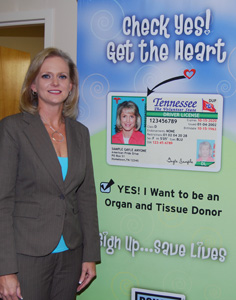Editorial
Front Page - Friday, August 21, 2009
Tennessee Donor Services working to register donors, save lives
Samara Litvack

Tennessee Donor Services is the organ recovery agency for the entire state of Tennessee and part of Virginia. It operates through four offices, in Chattanooga, Nashville, Knoxville and
Johnson City.
“Our main mission is to provide those life-saving organs to people in need,” says Dawn Benjamin, public education coordinator. “Another part of our mission … is educating the public on donation, getting their questions answered, providing public awareness and, more importantly than public awareness is really encouraging and offering people the opportunity to sign up to be a donor.”
For that reason, Tennessee Donor Services is focusing currently on filling the Tennessee Donor Registry, a database through which people can sign up to become organ donors. Launched about a year and a half ago through a partnership with the Department of Safety, Benjamin says the new registry has greatly improved.
“Most people know to sign up to be an organ donor; you can do that on your drivers license,” says Benjamin. “In the state of Tennessee, the way we document it is when you get your license back, if you check ‘yes’ to question number seven, you’ll have a little heart on the top right hand corner of your photograph and that indicates that you have documented your wishes. And it serves as a legal document, just like a living will.”
To supplement that, the Tennessee Donor Registry now includes an online component for people who want to sign up before their license is due for renewal. The Web site, www.tndonorregistry.org, enables donors to document their decision online by simply entering their driver’s license numbers.
Benjamin says donors are also encouraged to talk with their families, as it is crucial they know their loved ones’ decisions when it comes to this issue.
In keeping with the Department of Health and Human Services’ goal of having 100 million donors by July 1, 2001, Tennessee Donor Services hopes to have half the state’s licensed drivers registered by the same date.
“Right now, we have 1.2 million people who are registered, and there is a total population of people who have drivers licenses of 4.3 million in the state of Tennessee,” says Benjamin.
Tennessee Donor Services sets up booths in Departments of Safety across the state to dispense information about becoming an organ donor. Such booths can be seen once a month in the larger area locations, such as Bonny Oaks and Red Bank, and also in Cleveland, Athens and as far as Coffee County.
Benjamin thinks this effort is helping to not only inform the public, but also educate the staff of the departments. Armed with information, staff can more confidently ask license recipients if they would like to become organ donors, and are more equipped to answer any questions they may have.
“We even provide each office with a notebook that has the commonly asked questions so they can look things up,” says Benjamin. “We’re very fortunate in the state of Tennessee that we’ve been able to do this, and that’s our number one goal ... is to direct people to the registry. And so we’re really excited with the results that we’re having and hopefully we can make our goal.”
Aside from setting up booths at the Departments of Safety, Benjamin takes extra care to educate the public through as many means possible. She visits high schools in a 14-county service area and speaks to driving permit-aged teens about becoming organ donors.
No matter where she sets up, Benjamin brings along people whose lives have been affected by organ donation whenever she can.
“That really touches people,” she says. “As far as donor family members, I think if you ask them, this was really a tribute and a legacy for their loved one to be a donor, and it’s something they do to honor their loved one. We have a lot of donor families who are passionate about this cause.
“And of course, the recipients are so grateful for that second chance at life. I have several recipients who have two birthdays – they have their birth date and then they have the date that they received their transplant.”
The more people hear these stories, she says, the more they realize the possible impact of becoming an organ donor.
“I always tell them to put themselves in the place of somebody who needed a transplant,” Benjamin says. “If the doctor told you that you were going to die if you didn’t get an organ transplant and one became available, would you take it? I would say probably, the majority of us would.
“It works both ways. If you’re willing to receive a gift, you should also be willing to give it, in my estimation.”
To sign up to become an organ donor, visit the Tennessee Donor Registry online. For more information about donation, including the criteria for
becoming a donor and position statements from churches and religious organizations, visit www.donatelifetn.org.
|
|